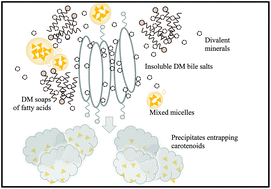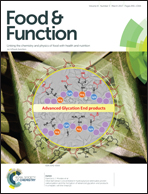Negative effects of divalent mineral cations on the bioaccessibility of carotenoids from plant food matrices and related physical properties of gastro-intestinal fluids†
Abstract
Carotenoid intake and tissue levels have been frequently associated with reduced risk of chronic diseases. However, their bioavailability is low and influenced by many dietary related parameters. Divalent mineral cations have been suggested to interfere with carotenoid digestion and to hamper micellarization, a prerequisite for their uptake, via complexation of bile salts and precipitation of fatty acids. In the present investigation, we have evaluated the effects of increasing concentrations of magnesium (0–300 mg L−1), calcium (0–1500 mg L−1), zinc (0–200 mg L−1), and sodium (0–1500 mg L−1; control monovalent cation), on carotenoid bioaccessibility from frequently consumed food items rich in carotenoids (tomato juice, carrot juice, apricot nectar, spinach and field salad), following simulated gastro-intestinal digestion. In addition, physicochemical parameters of digesta (macroviscosity, surface tension), micelle size, and zeta-potential were evaluated. All divalent minerals (DM) reduced bioaccessibility of total carotenoids (P < 0.01), as well as of individual carotenoids. Calcium and magnesium led to reductions of up to 100% at the 2 highest concentrations. Curiously, sodium increased (P < 0.01) carotenoid bioaccessiblity of most investigated matrices. The absolute value of the zeta-potential decreased with increasing concentrations of DM, suggesting a decreased stability of the colloidal digesta dispersion. Viscosity decreased, except for apricot nectar samples, while surface tension increased with DM concentration (P < 0.05). Thus, at physiological ranges, calcium and magnesium could negatively impact carotenoid bioavailability, while for zinc, negative effects were only seen at supplemental concentrations. The potential negative effects of DM on carotenoid bioavailability should be further studied in vivo.



 Please wait while we load your content...
Please wait while we load your content...